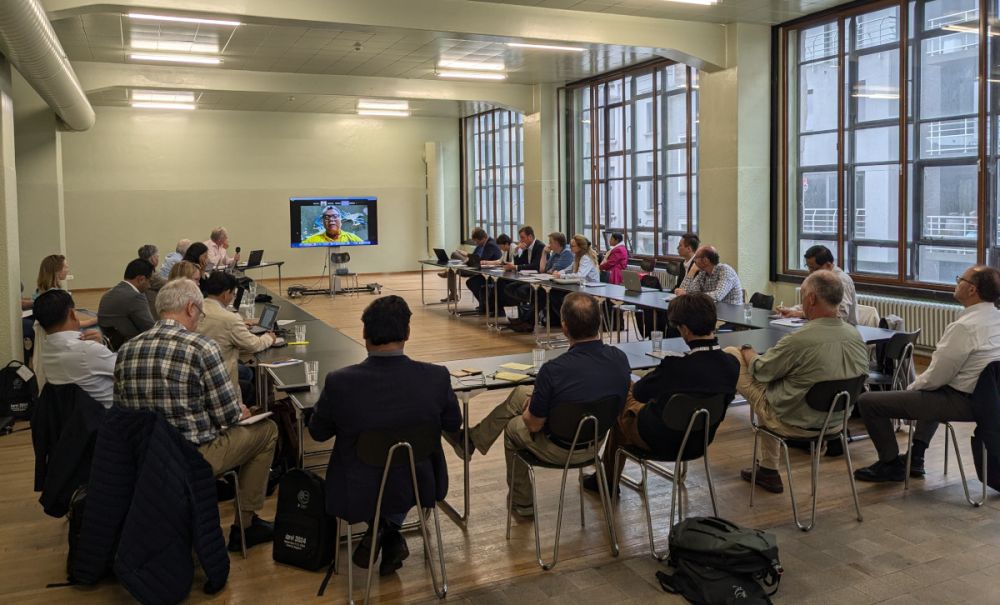Videos available: First International Artemia Aquaculture Consortium Conference and Members' Meeting
14 November 2024 | 3054 views | Artemia, Better management practices, Genetics and Biodiversity, Hatchery and nursery, Health and Biosecurity, Nutrition and feeding

First IAAC Conference
The first ever IAAC conference was a free half day even held in Ostend, Belgium on 9 September, as a prelude to Larvi 2024, which ran from 9-12 September. NACA would like to thank the Larvi organisers for their kind use of the venue, De Grote Post. Around 80 people attended.
Video recordings of the presentations are now available on the NACA YouTube channel or via the links below.
The conference featured twelve presentations introducing the IAAC and providing an overview of many of the issues surrounding Artemia, including management of salt lakes habitats that still provide the bulk of global Artemia supplies, Artemia biodiversity, hatching optimisation, and aquaculture of Artemia biomass in tanks and ponds. A key observation from industry, in line with the comments in the Rome training programme, was that shrimp postlarvae survival and growth is significantly improved if the amount of Artemia provided is increased past what is currently considered conventional wisdom. The presentations are listed below.
Programme and video links
- Welcome and Introduction (from ISA to IAAC)
Patrick Sorgeloos - The International Artemia Aquaculture Consortium
Simon Wilkinson - Artemia tank cultures: experience from Malaysia
Yeong Yik Sung - Development and utilisation of Artemia resources in China
Liying Sui - Artemia resiliency in response to dramatic changes in Great Salt Lake salinity and volume
Brad Marden - Adaptive management of salinity in Great Salt Lake: an adjustable berm provides a unique tool to protect the Artemia population
Phil Brown - New techniques for (epi)genotyping of Artemia species and strains
Stephanie De Vos - Predicting Artemia nauplii hatching kinetics through temperature measurement
David Johanson - Optimising co-feeding strategies for enhanced survival and growth in Litopenaeus vannamei postlarvae: a comprehensive study on Artemia inclusion and dietary options
Yattish Ramena - Reduction of Artemia fed to larval shrimp results in inferior pond success
Robins McIntosh - Artemia4Bangladesh project
Meezanur Rahman - Year-round Artemia pond production in monsoon climate in Thailand
Banchong Nissagavanich
First IAAC Member’s Meeting
The first IAAC Members’ Meeting was held in the afternoon following the IAAC Conference. The proceedings involved two panel discussions, by the Academic Sector and Private Sector respectively. The panels included remote members participating via Zoom.
The Academic Sector panel was chaired by Gonzalo Gajardo with concluding remarks by Liying Sui, Vice-Chair of the IAAC Steering Committee. The panel featured a series of informative presentations followed by discussions on:
- FAO AquaGris project (Graham Mair).
- Artemia China AquaGris (Xuekai Han).
- Genetic stock identification (Li Ke).
- Artemia, species-taxonomic issues (Alireza Asem).
- Artemia: a model for biological studies (Parisa Norouzitallab and Kartik Baruah).
- Enriching Artemia with Bacteria (Annelies Declercq).
The Private Sector panel was chaired by Philippe Léger, who gave a welcome and introduction, with a round up by Patrick Sorgoos and concluding remarks by Yeong Yik Sung, Chair of the IAAC Steering Committee. The panel included presentations and discussions on:
Sustainable harvesting & production: ‘Practice’ vs ‘Ambition’
- ‘Ambition’ (Tim Hawkes).
- Practice at Great Salt Lake, UT – USA (Thomas Bosteels).
- Practice at Russian & Central Asian lakes (Alexander Nikiforov).
- Practice at China lakes (Gao Song).
Artemia cyst certification & labelling
- Developing guidelines on artemia cyst and biomass certification (Simon Wilkinson).
- Requirements for farmer (David Garriques, Tania Dewolf, Banchong Nissagavanich).
- Situation suppliers: ‘can do vs cannot’ (Patrick Waty, Thomas Bosteels, Alexander Nikiforov, Gao Song).
Artemia, still the preferred live feed? Why/not? – farmer’s perspective
- Why? Perceived constraints? (David Garriques, Tania Dewolf, Banchong Nissagavanich).
- Technology at service (Geert Rombaut).
Future of Artemia – Bridging the gap
- Producing more? (Gao Song, Alexander Nikiforov).
- Using less? … using more? (David Garriques, Tania Dewolf, Banchong Nissagavanicho).
Creative Commons Attribution.